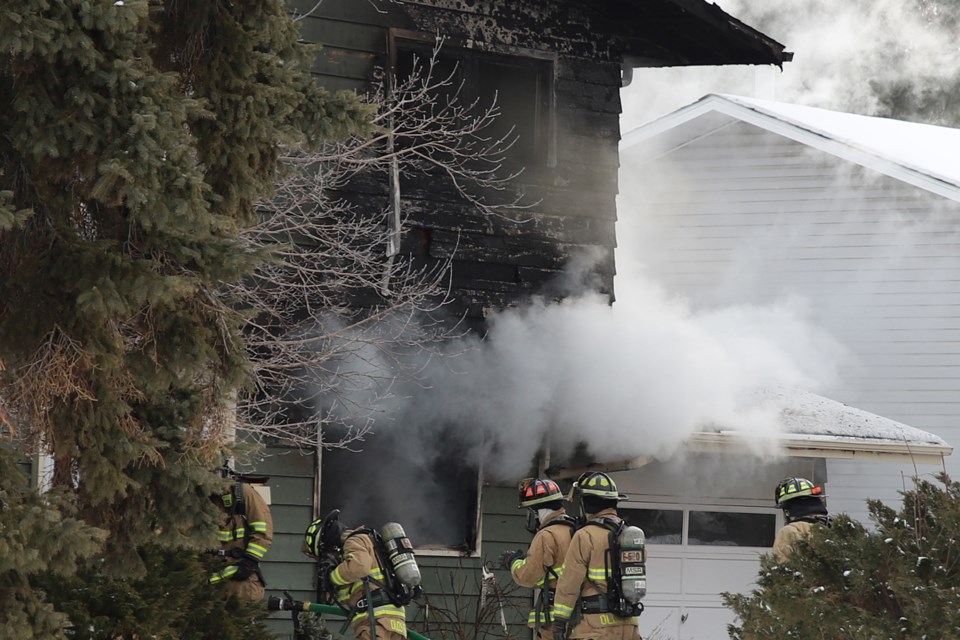OLDS — If you’re a property owner in Olds, you might want to check your insurance policy to make sure you’re covered in case your property is hit by a fire and you’re faced with a bill for putting it out.
Because, under a bylaw passed July 8, the fire department can continue to bill for costs incurred in fighting a fire on your property.
However, the town's fire department chief and director of protective services, Justin Andrew, stresses firefighters would put out the fire first and discuss the bill later.
Another aspect of the bylaw is a requirement for property owners to ensure that if there is a fire hydrant by their property, and that it’s kept clear of vegetation or other obstructions, including snow.
The bylaw also gives the fire department the ability to deal with a situation in which combustible materials on a property are deemed to pose a fire risk.
“We will never withhold service to anybody due to their ability or inability to pay. That's not how this works,” Andrew said when the bylaw came up for initial discussion during council’s committee-of-the-whole meeting on July 2.
“We provide service and after the fact, we figure out (the cost) administratively, and we want to make sure that that’s clear to everybody.
“We would never say, ‘do you (pay) cash or credit? Would you like to choose one now before we respond? That's not part of the deal,” he added.
“What we propose within this is that there is a cost recovery scale that, based on council feedback, (is) affordable and reasonable.”
Andrew said a previous fire bylaw gave the Town of Olds the ability to recover firefighting costs, but its wording was “somewhat vague,” hence, the desire to make the wording more explicit in the new bylaw.
He said the cost of equipment like fire trucks is covered well by Town of Olds funds.
The charges he’s talking about will cover the costs to attend specific emergency incidents. Those costs include the hourly wages of firefighters and other related costs such as fuel to get there and equipment to use at those events.
“If you burnt spaghetti on your stove and that elicited a fire response, you would probably receive a bill that would be upwards of $2,000, and we all know that that wouldn't go very well in a community like this,” Andrew said.
“I would hate to have to present a bill to somebody for that, as much as you as council, you would hate to receive the concerns from citizens about receiving the bill,” he added.
“We tried to really (take) a practical approach that was not going to be ridiculous.”
Andrew said in most cases, firefighting costs are covered in a homeowner’s insurance policy.
Coun. Heather Ryan checked her own policy and was relieved to find that those costs are covered in her case.
Coun. Darren Wilson said he would be “scurrying home” right after the meeting to check out his coverage.
“This whole thing of cost recovery certainly was a bit of a hot button topic a month or two ago when there was an incident in town, a residential fire,” he said.
Ryan said the Town of Olds should alert residents to the cost recovery policy and advise them to check if their insurance covers firefighting costs.
Andrew said the municipality did in fact plan to release information on the cost recovery policy that day.
“Obviously we wanted to float this to council first, and we wanted to make sure that it was received well,” he said.
Andrew said the town's chief administrative officer Brent Williams can, if necessary, use his authority to look at cases where “financial hardship is a consideration on the payment of a bill for service.”
“Then he has all sorts of tools at his disposal on how he deals with that, whether it's payment programs or prolongation, all sorts of those kind of things,” he added.
Wilson said people should understand that Olds is not alone in covering firefighting cost in this way.
“We aren’t unique as far as the cost recovery model, we're not blazing a trail here in the Town of Olds,” he said.
It was noted that other municipalities cover those cost as part of overall taxation or through a specific fire tax and that may not be considered fair to those whose properties aren’t hit by fire.
Williams said Olds is the first municipality he’s worked in that didn’t have a “robust cost recovery mechanism.”
He too stressed that firefighting costs are generally covered by insurance.
Williams said some people “gamble” and don’t ensure they have firefighting covered in their insurance.
“We're getting in line with what has been the standard for a lot of years,” he said.
As for the requirement to keep fire hydrants clear, Andrew said, overgrown vegetation and/or snow accumulation surrounding fire hydrants can be a real problem.
He said the wording to keep such areas clear is not new. Staff just wanted to ensure it’s in the fire bylaw as opposed to other legislation.
In the case of combustible materials, Andrew said the bylaw clarifies wording around this possibility, making it clear that the fire department has the authority to deal with it.
He used the example of a pile of wood that might be placed against a fence that’s only a couple of feet away from a neighbour’s house.
“In (that instance), we could say that's an undue fire hazard, and if it caught fire, it could spread to the neighbouring property and have severe effects,” Andrew said
“We can take action to remedy that quickly. So that gives us the tool in our toolbox if we need to make sure that everybody's property is safe as possible.”



